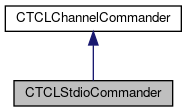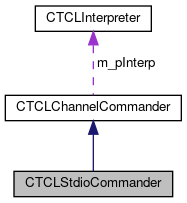#include <CTCLStdioCommander.h>
Inheritance diagram for CTCLStdioCommander:

Collaboration diagram for CTCLStdioCommander:

Public Member Functions | |
| CTCLStdioCommander (CTCLInterpreter *pInterp) | |
| virtual | ~CTCLStdioCommander () |
 Public Member Functions inherited from CTCLChannelCommander Public Member Functions inherited from CTCLChannelCommander | |
| CTCLChannelCommander (CTCLInterpreter *interp, Tcl_Channel channel) | |
| virtual | ~CTCLChannelCommander () |
| virtual void | start () |
| virtual void | stop () |
| Tcl_Channel | getChannel () const |
| virtual void | onInput () |
| virtual void | onInputException () |
| virtual void | onEndFile () |
| virtual void | onCommand () |
| virtual void | prompt1 () |
| virtual void | prompt2 () |
| bool | stopped () const |
Additional Inherited Members | |
 Static Public Member Functions inherited from CTCLChannelCommander Static Public Member Functions inherited from CTCLChannelCommander | |
| static void | inputRelay (ClientData pData, int mask) |
 Protected Member Functions inherited from CTCLChannelCommander Protected Member Functions inherited from CTCLChannelCommander | |
| std::string | prompt1String () |
| std::string | prompt2String () |
| std::string | getPromptString (const char *scriptVariable, const char *defaultValue) |
 Protected Attributes inherited from CTCLChannelCommander Protected Attributes inherited from CTCLChannelCommander | |
| CTCLInterpreter * | m_pInterp |
| Tcl_Channel | m_channel |
| std::string | m_command |
| bool | m_active |
Detailed Description
STDIO channel commander is a channel commander that prompts on stdout, and accepts commands on stdin. Registering this in the event loop, and then entering the event loop yields a powerful result, tcl with an event loop running but still accepting commands on stdin (event loop without the vwait command).
See also CTCLLiveEventLoop which is a class that can set this all up and contains the event loop code itself.
Constructor & Destructor Documentation
◆ CTCLStdioCommander()
| CTCLStdioCommander::CTCLStdioCommander | ( | CTCLInterpreter * | pInterp | ) |
Construction requires
- Base class construction with the stdin channel
- Initialization of the m_stdOut channel member data:
These can be determined using Tcl_GetStdChannel so we don't need the caller's help to get all this going:
- Parameters
-
pInterp - Pointer to the interpreter object to which commands will be submitted.
◆ ~CTCLStdioCommander()
|
virtual |
Destruction is a placeholder to ensure base class destruction is done.. that's where the action is.
The documentation for this class was generated from the following files:
- libtclplus/include/tclplus/CTCLStdioCommander.h
- libtclplus/tclplus/CTCLStdioCommander.cpp
 1.8.13
1.8.13